The Menace of The Immigrant Tide - 1920
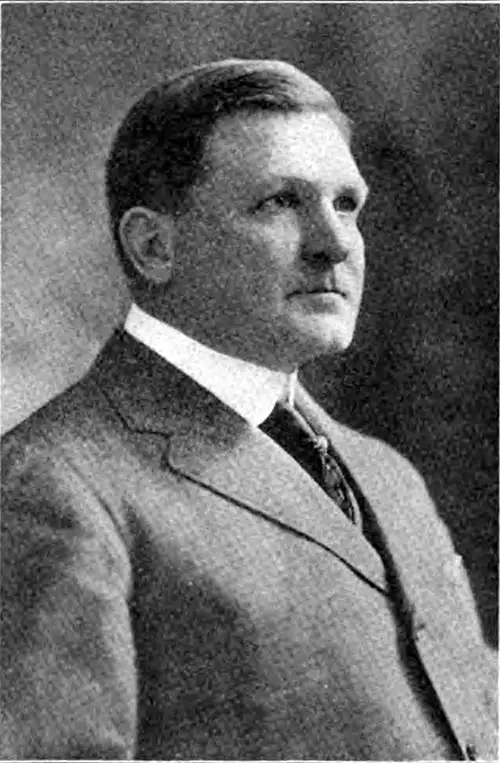
Commissioner of Immigration Frederick A. Wallis. American Industries, December 1920. GGA Image ID # 14e84304fe
Frederick A. Wallis, Commissioner of Immigration for the Port of New York, in his first signed story, tells of the great danger in the millions headed for the United States and discusses remedies
Written especially for AMERICAN INDUSTRIES
By HON. FREDERICK A. WALLIS
United States Commissioner of Immigration, for the Port of New York. More than three thousand immigrants are coming into Ellis Island almost daily.
More than one million will be the count for the fiscal year 1920-1921. More than ten million are now waiting in various parts of war-stricken Europe, to swarm to the United States as soon as they can obtain transportation.
These millions are not immigrants in the strict sense of the term. Many of them are refugees—refugees from lands that have been harassed and torn by War and treason for six years; refugees from countries that offer them little now but discontent, discord, unhappiness, impoverished living conditions, and disease.
These millions are looking to the United States as their Promised Land; their Haven of Relief; their asylum.
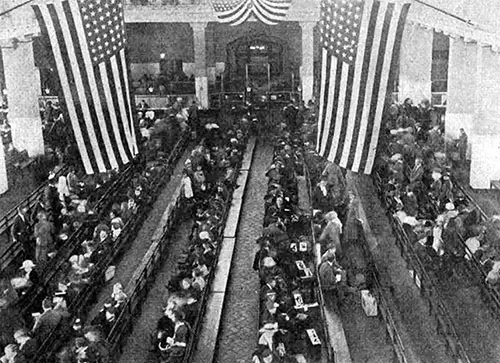
First Gateway to America -- Ellis Island. Underwood & Underwood. American Industries, December 1920. GGA Image ID # 14e85908ea
The higher number perhaps is migrating with the full thought of becoming law-abiding, self-supporting, industrious citizens. They are coming with smiling faces and with arms outstretched in supplication to the arms that are willing to give them welcome —if they are worthy of citizenship or domicile.
Their coming is growing every day more vital to the welfare of the country. National interest is awakening to the tremendous importance of finding a solution to this problem.
Just recently, I was visited by a committee of the National Association of Manufacturers, which is making an exhaustive investigation of every phase of the immigration question.
I understand this committee will submit a comprehensive and practical measure that will not only regulate immigration but distribute it in agricultural and industrial territories where it is so much needed and where it may best be absorbed.
I believe no higher public service can be performed by our prominent and able businessmen than by taking an active interest in this problem, which is becoming more and more complex with each shipload of 1mmigrants.
I am told by persons of unquestioned authority from Europe that at least eight million emigrants are ready to come here from a particular country, as soon as peace is declared, and the way is made clear.
From personal information I have received, I am inclined to believe more like fifteen million people are clamoring to come to America. Many thousands of them already have bought steamship tickets and are merely awaiting word that transportation has been provided.
Armies of this nationality are ready to come through Holland. Even Holland is losing thousands upon thousands of what they are pleased to call their best type of working people who are coming to this country to get away from the spirit of unrest and turmoil that has permeated the whole European fabric.
I am told authoritatively that three and a half million Italians are demanding passage to this country and that hundreds of thousands are on the steamships' lists. I am inclined to believe the actual figure is much higher than three and a half million. Further, I am told that half a million Poles are headed this way.
The British ships are bringing in thousands of Scotch, English, Irish and Welsh. What will happen when the bars of Russia are let down can only be guessed. Thousands upon thousands of steamship tickets have been issued and in the hands of intending emigrants for from two to five years. And there is no indication that this westward flood of humanity is to come to any sudden halt.
What are we to do about this tremendous influx? That is the most pressing, the most important and the most vital question before the country today. Congress must look to the situation at once. We must take up the problem and work it out fairly, frankly, and immediately.
We undoubtedly need a great many of these people, but where? Our farms, for instance, can take care of high numbers, for the farmers are crying for help all the time.
Our coal mines need men; so do our cotton fields and a great many other places where reliable, sober, and substantial people of good intent will be welcome. But then our whole country is in the process of readjustment—thousands of people getting out of the war-emergency work and going into other channels.
It undoubtedly would be a good thing if we could establish some sort of selective preferential scheme for the admission of these immigrants—for instance, the admission of thousands who would go to the farms—and exclude the barterers.
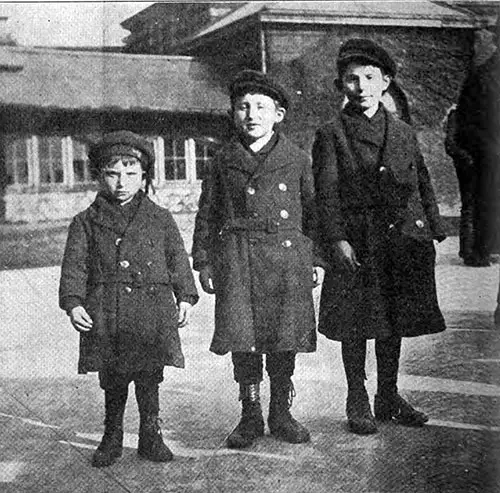
Types of Child Immigrants Seen at Ellis Island. American Industries, December 1920. GGA Image ID # 14e875a2d1
The lazy, for these, are the classes that mostly make for radicalism. We need the man of good intentions, but we cannot establish any sort of preferential admission without first amending the Constitution of the United States.
Numerous suggestions have been made for the handling of the coming millions, and there are many bills before Congress on the subject. But it is a great question.
Some very sane and sober persons are in favor of shutting down entirely on immigration for a stated period—until the country can readjust itself to the new conditions which have followed in the wake of the War. But it is a very debatable question whether this is desirable.
Others would limit it to immediate blood relationship, others put it on a percentage basis. In my opinion, we are undoubtedly receiving today many of the very types of immigrants that have ever come to this country.
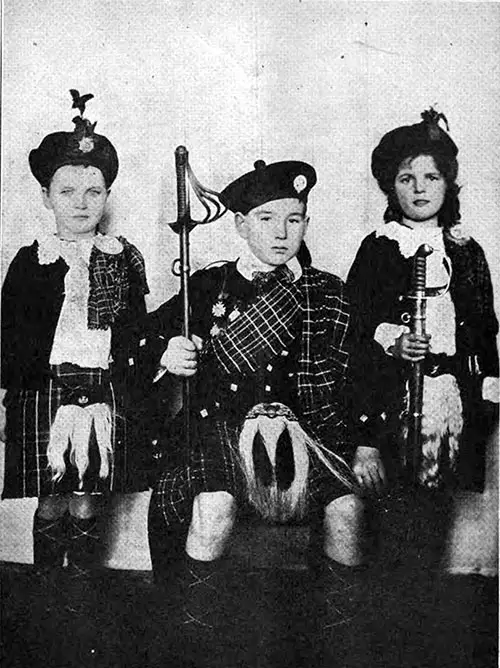
Three Young Highlander Immigrants at Ellis Island. American Industries, December 1920. GGA Image ID # 14e87771e0
They are of all the nations on the face of the earth. The more significant part of them says they are coming to get away from the conditions of unrest and discord in their native lands. This very fact should be sufficient guarantee that these people are mostly desirable.
There are Romanians, Greeks, Italians, Jews, French, British, Persians, Indians, Czechoslovaks, Poles, Arabians, Turks, Serbians, Norwegians, Finns, Danes and West Indians.
The other day about five hundred West Indians, black as tar, and some of them outfitted in the utterly grotesque style, arrived; and they were just nearly as clean a looking lot as I have seen in many a day.
Then we had inline fifty Norwegians, great, sunny faced men, with clear blue eyes, hulking shoulders, and radiating perfect health, all headed for the lumber camps of the Northwest.
Back of them came a group from North-Central Europe, narrow-chested, bent, and miserable in comparison with the Norsemen ahead of them, and while they were obviously within the law of admission, they would never make constructive citizens. They were of a class that can be nothing more than parasites.
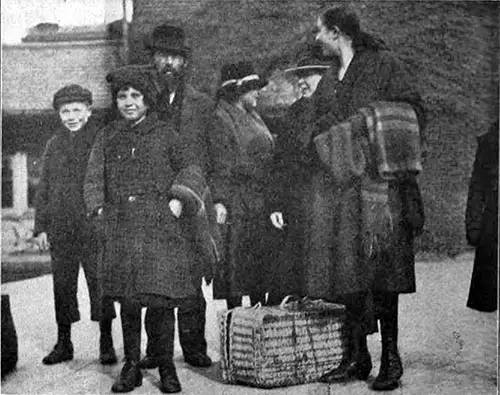
Some of the Russian Refugees at Ellis Island. American Industries, December 1920. GGA Image ID # 14e8e34199
Look into the faces of the vast majority of these people, and you can plainly see that they are arriving at one of the happiest moments of their lives—their entry into the United States.
Question any of them, and they will all say they are coming here to get away from their own countries because of the disturbances; because they cannot find work and cannot support their families.
All of them manifest a willingness and happiness to go to work at the tasks for which they are set down on the ships' manifests—as mechanics, farmers, tailors, miners, potters, shoemakers, laborers, lumberjacks, bricklayers, and so on to the end of the list.
But will they do so?
That is the pivotal question and the one on which the whole treatment and solution of the menace depend. If they were taken hold of immediately on leaving Ellis Island and led into the right environment they could be taught that this country means their future happiness and prosperity if they live according to the laws of the land.
That the country welcomes the immigrant who is determined to work, either with brain or brawn; that the country stands for industry and freedom; that it rewards thrift; that it offers an equal opportunity to them to make their way as they choose; that it wants the worker and does not want the laggard and the discontented.
These people all land under the shadow of the extended arm of the Goddess of Liberty, to the newcomer a symbol which breathes reality into his dreams.
We could maintain in this new citizen that fine exaltation—if we had a proper system of receiving him and educating him after he lands.
The law of our land says these immigrants must have a free and equal opportunity to make their way as they choose. So long as that law permits immigrants to come without restriction, except such medical and moral limits as are necessary for the protection of the country, then we must do our part to assimilate them and make them good citizens.
But what do we do? We look over the emigrant as he leaves the foreign shores. We put him under the most rigid physical examination when he arrives at Ellis Island. We satisfy ourselves that he is healthy, sane, capable of being self-supporting, that he has never been in jail, that he is reasonably industrious; that he has a definite job to go to.
But what of the rest? As soon as he gets off Ellis Island, he is absolutely free to go anywhere and do anything that he pleases; or anything that is argued into his mind, by his friends, whether they are good or bad citizens of this country, for every immigrant naturally seeks the few friends he has here as soon as he lands.
Some of them come without friends, and you will occasionally see a young immigrant land at the Battery, friendless and unmet, and stand, holding his small bundle of belongings and gazing at the towering skyscrapers of the lower end of New York in bewildered amazement.
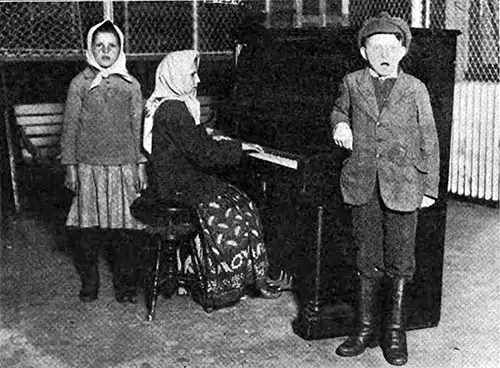
Talented Family Passes the Time at Ellis Island. © Underwood & Underwood. American Industries, December 1920. GGA Image ID # 14e8e4cb0f
He is like a drop of water in the ocean. Right then is the psychological time to get that young man and turn him into the current that will make him a good citizen instead of one of the dissatisfied radicals, wanting everything and giving nothing.
And right here I might say that quite the most important thing in the whole problem of immigration is the matter of distribution. At the present time, the highest numbers of these people are headed towards the cities—where they are not needed and not wanted.
Some of them find their way to the farms, where they are much needed, but the vast majority flock to the cities, which is particularly undesirable in this period of readjustment, because of food and housing conditions.
I have been called upon within the last few days by officials of the cities of Detroit, Buffalo, and Akron, who have implored us to stop sending the immigrants to their cities and to induce them to go to the farms.
There are thousands of people out of work in those cities today, because of the slowing down of many factories that were occupied in supplying untold quantities of war material.
These added thousands of newcomers only make conditions worse. They cannot find work. They are not producers, and they remain in the cities eating up the food that is scarce enough at present.
I have been told by the vice-president of one of our greatest Western railroads that in the Dakotas next year, the harvest out there will be less than sixty percent of what it was this year—because they cannot get sufficient labor out on the farms.
Proper distribution of the immigrants, if this could be brought about by legislation, would circumvent this threatening situation. It would send thousands to the farms, thus dealing with one of the most effective blows to the high cost of living. It seems to me that much could be done in encouraging these people to take up small bits of ground and work them. This would be productive.
Take the West, with its millions of acres of land. I think the newcomers should be encouraged to settle out there and raise corn, wheat, rye, oats, and livestock.
One of our significant faults in dealing with the immigrant is the placing of too much faith in the so-called literacy test. There never was a greater farce than this so-called literacy test.
It does not mean that a man will become a good productive citizen, just because he can read and write a few words. Most of the seventy-two anarchists that we had penned up here a few days ago, could read and write, some of them in several languages.
Some of them would have passed the most rigid literacy test devised. Still, they undoubtedly were terrible people for this country.
They were destructive citizens; they did not want to work; they did not want to go to the rural districts where there is plenty of work; they did not want to go to the mines; they did not want to go into the factories; they did not want to go into the schools.
All they wanted was to get into this country. Then they would have started on their campaign of radical education against the very land that was giving them a haven.
There is no safety to the country in such tests. We need something more practical. We need tests that will determine whether a man or woman intends to be a real worker and a real law-abiding citizen.
Many of these people who cannot possibly pass a literacy test will make the most substantial citizens. Many of these are the hard-working, sunny faced peasants, who are happy to be in free land and will stay here. The others we should, and must, keep out of the country.
We have numerous requests from people of good intentions who want to reach these immigrants as soon as they come here and direct them along the right paths for the development of American principles. But then again, there is opposition from those who do not want to do anything for the immigrant but let him into the country.
They set up the cry that there is an effort to exploit the laboring man. Nothing could be further from right. No such thing is attempted or intended; nor could such exploitation follow if these people were taught correctly what this country stands for and means to them.
We must have some agency to bring out before these peoples the principles and fundamentals on which the country was built. I believe we should have some say as to who is to be allowed to come here, and where they should go.
I do not think that we should be made the dumping ground of all humanity; those other nations should have all the wheat, and we receive all the chaff. Perhaps we could have a reciprocal agreement with other countries utilizing which we could have our representatives on the other side of the ocean, to determine who should come here.
We do not want undesirables, and I would instead send back a thousand good men than let one bad man come into the country.
Our slogan is, "When in doubt, deport!"
The gates at Ellis Island swing in both directions. Inwardly in cordial reception to the man in sympathy with American ideals; outwardly eternally and impassibly outwardly — to the man or woman, who by word or deed, would destroy the peace and tranquility of our nation or threaten the overthrow of her free institutions.
Thank God, a new Americanism, baptized in the blood of modern and dedicated manhood, has been born, and this nation is moving toward social, political, and economic ideals that are prophetic of a nobler day.
Frederick A. Wallis, "The Menace of the Immigrant Tide," in American Industries Magazine, New York: The National Manufacturers Company, Vol. XXI, No. 5, December 1920, pp. 7-10.
THE IMMIGRATION MENACE
Frederick A. Wallis, Commissioner of Immigration for the Port of New York, contributes to this number of AMERICAN INDUSTRIES an article on immigration. This is his first authoritative story, and it is published simultaneously in some of the most important newspapers throughout the country.
Commissioner Wallis brings out very clearly the growing menace to the United States in the influx of the human droves that are fleeing to this country to get away from the impoverished and run-down condition of their native lands. He emphasizes the dangers in this tremendous flood coming so fast that it is not being properly assimilated.
He points out a very pivotal sin of omission being committed by our own national machinery—that after the immigrants land practically no provisions are made for their proper guidance along lines that will make them law-abiding people.
They are swarming to the cities, already overcrowded, and are becoming consumers, entertainers, loafers, instead of producers. Some of them are potentially good citizens, but significant numbers are taken into the worst environments, which breed only discontent, dissatisfaction, and ideas that run tangent to good citizenship.
The Commissioner flatly says something must be done immediately for the protection of the country. Numerous recommendations are being made, and an endless number of bills are being introduced into the National Congress.
The Commissioner suggests, among other things, the appointment of a Federal Board to act as a sort of clearinghouse for immigrants when they land. This, combined with a suggestion of preferential immigration, might be a very potent factor toward reducing the menace.
No sane person can deny that the immigration question is probably the most vital one facing the nation today. The United States is being made the dumping ground for all of Europe.
Many of the immigrants are plainly refugees, as the Commissioner says, coming to this country to escape the drudge of again setting their own lands in order after the upheavals of War.
Production of foodstuffs and raw materials is now the greatest need for Europe, as well as of this country.
Should the United States adopt a preferential immigration scheme, or a selective scheme, it would enable the Government Board to act as a sort of clearinghouse and admit the men who intend to be producers instead of consumers.
This country can assimilate thousands of virile workers. Still, it has nothing to offer at the present time, to the shiftless and lazy, and the man who knows no law.
D. M. Edwards?, Editor, "The Immigration Menace," in American Industries Magazine, Vol. XXI, No. 5, December 1920, p. 22. (This section appears to be an op-ed piece, possibly written by the magazine's editior, D. M. Edwards and included in the same issue as the original article. -- GGA)
